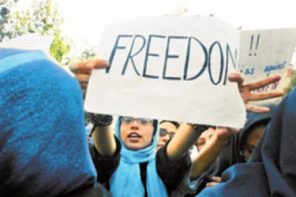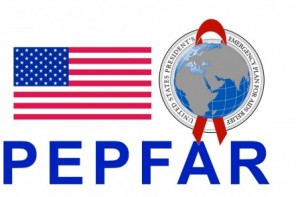This is the uncomfortable and necessary question author Rebecca Hamilton raises over at The Atlantic today. Hamilton is the author of Fighting for Darfur, an analysis of the anti-genocide advocacy movement in the United States, and her Atlantic piece is based on a newly declassified State Department memo which bolsters her book’s argument about the application of the word “genocide” to the conflict in Darfur.
Hamilton focuses on the State Department investigative team whose work in Darfur in the summer of 2004 led to Colin Powell’s declaration of genocide in Senate testimony that fall. This was a Really Big Deal: Exactly ten years after the State Department dithered on calling the unfolding massacres in Rwanda genocide, its top officer was using the word to describe a place most Americans, at that point, hadn’t heard of.
For a staff at State that remembered the Rwanda decision — some people in the legal affairs office during the Darfur determination had been there during the Rwanda debate — and the shame that followed, this was perhaps even a moment of institutional activism. Hamilton writes that this activism (my word) can be understood in a few ways:
“There are more and less charitable ways of understanding Powell’s decision: As a laudable and historic pushing of the boundaries in a genuine effort to stop genocide; as a misguided, or even self-serving, attempt to avoid the risk of a Rwanda-like shaming when the story of Darfur was eventually written; or as an endeavor to claim the moral high-ground in the midst of the war on terror that ultimately undermined the power of the genocide label. What is not in question is Powell’s strategy of using the determination to spur other countries to act in Darfur failed.”
And it seems he really did have that hope. (Hamilton’s book is a must-read for her interviews with Powell and others, including Kofi Annan at the UN, which did not follow the US example and use the word “genocide.”) But there were all these other fussy things interfering with hope — not the least of which, Hamilton suggests, was the credibility Powell had lost by testifying about the existence of weapons of mass destruction in Iraq before the UN in 2003. Statecraft doesn’t happen in a vacuum.
Her conclusion that has much broader implications — think Congo minerals or LRA Act or, perhaps, Libya. Hamilton writes that the Clinton Administration’s decision to avoid the genocide label during Rwanda’s genocide, and the Bush Administration decision to use the label during violence in Darfur, were both…
“influenced more by what they believed a genocide determination would mean in terms of action rather than by a strict interpretation of the evidence they had before them. The results to date suggest that neither Rwandans nor Sudanese have been well-served by such instrumentally-motivated avoidance, or use, of the g-word.
What lessons should be taken from this bleak history? One lesson is that it is time to question the assumption that whatever the U.S. government says (or does not say) will determine outcomes on the ground. Another is that it is unwise to place so much stock in a label – even one as potent as genocide.”
Let’s bold that first one: “It is time to question the assumption that whatever the U.S. government says (or does not say) will determine outcomes on the ground.”
PS: If this piques your interest, you should follow Hamilton’s website.



I’m surprised that anyone would think that “whatever the U.S. government says (or does not say) will determine outcomes on the ground” – if you had wonders about it before, especially with regard to genocide (or any other humanitarian issue) they should have been completely demolished by Samantha Power’s book some ten years ago…
Actually, I think that’s exactly backward. Hamilton’s piece (and more broadly her book, which you should definitely check out for more on this) suggests that what was suggested after Rwanda is that what the US says does matter. That suggestion comes primarily from Power’s book, which forcefully argues that if the United States had mustered the will to be linguistically honest about Rwanda, it might also have taken more robust and potentially life-saving action. In fact, Power’s research demonstrates that the U.S. avoided the word precisely because it did not want to take action. Other scholars have argued that the kind of action American denials avoided may have helped save lives.
Hamilton is instead pointing out an irony — that following the “what we should have done viz. Rwanda” playbook didn’t have the real-world effect in Darfur that may believe it would have had in Rwanda.
You are, of course, absolutely right about Power’s argument. In my hastily written response, I failed to make clear that I never really thought that actually using the word “genocide” would, ultimately, make much difference.
While previous US administrations had been hesitant to use the word, in part of out fear that doing so would trigger obligations to intervene, they’ve also never been ones to avoid carrying out treaty obligations if they found them inconvenient before. So there was little real reason to think this time would be different, especially under an administration that was so outwardly hostile to the UN. And as Hamilton pointed out, this is exactly what happened – the State Department basically said, “The Genocide Convention doesn’t mean what it says it means” and proceeded to ignore it, public outrage be damned.
Even so, there was very little moral outrage at the time, given that most of the public’s attention was focused on the complete cluster-f**k that Iraq had become (the announcement after all was made just weeks before the US set about leveling the city Fallujah).
Who knows, maybe if we hadn’t been focused on Iraq we might have done something different, but I won’t be holding my breath for action the next time we find ourselves in a similar situation.
Ah! Thanks so much for your follow up. I think I understand your point much better now. I also think you’re spot-on, that there are many other ways out of meeting legal obligations — were we to decide we had them — under the genocide convention (or any other). There was an article years ago in the Yale law journal, by Oona Hathaway, that found a troubling (if unexplained) relationship between signing human rights treaties and (I paraphrase) violating human rights. Indeed, so much more going on here…
Your point about contemporaneity of events — that we call it genocide in Darfur even as plans to level Fallujah were at foot — is well taken… Perhaps it’s a wonder we continue looking at all for justice or reason (beyond self/national interest) in international affairs.
Hi Jina,
Fascinating post. I suppose that the counterpoint of this is that it would be naive and probably stupid to suggest that the US govt should just say what it thinks regardless of the consequences. Diplomacy is all about picking one’s words carefully. I’m a little bit fuzzy on what the various laws (US and international) say about what action needs to be taken on a declared genocide, but my guess is that nothing less than a UN Security Council motion to that effect will have much impact on the ground. (Not that SC motions necessarily count for very much either …)
MJ
Im a senior high school student and im doing a report on all the genciodes in Africa and why America did not get involved. I would love to know why America refuses to help Africa.